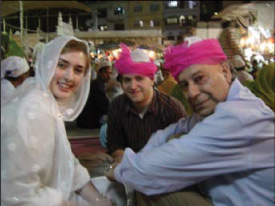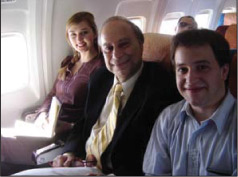Frankie and Hailey Go
to the Muslim World with the Leading Islamic Scholar “Our
Favorite Professor”
By Hailey Woldt and Frankie Martin
Washington, DC
 Hailey Woldt, Frankie Martin and
Professor Akbar Ahmed at the site of the Sufi shrine
in Ajmer
Hailey Woldt, Frankie Martin and
Professor Akbar Ahmed at the site of the Sufi shrine
in Ajmer |
Frequently
on the journey we would turn to each other and ask, “Is
this really happening?” Only one year ago exactly we
had been sitting in an honors lecture class taught by Professor
Akbar Ahmed on the “Clash or Dialogue of Civilizations”
as virtual strangers, but as the three of us were together
in a car in India for hours, hot, hungry, and tired. It seemed
like we had been family for ages.
Last year at the American University, Frankie Martin, then
a junior, and Hailey Woldt, a freshman, had no idea that we
would be challenging the very “clash of civilizations”
concept that we had discussed so much in class. Professor
Ahmed hinted to both of us that he would be doing a project
with the Brookings Institution, the Pew Forum, and American
University called “Islam in the Age of Globalization,”
a topic both of us had become very interested in. We offered
our devoted assistance free of charge and thus began our long
journey to what became the best trip of our lives and the
greatest learning experience we have ever had.
As the research in the office continued, Professor Ahmed argued
that he needed a field trip into the Muslim world for his
study and it would not be complete without his students, despite
the sponsoring institutions’ protests. Once offered
to us, both of us jumped at the chance, genuinely shocked
that we were about to be given an unbelievable gift. The trip
would give us a chance to take our ideas outside the classroom
and be “goodwill ambassadors” on behalf of the
United States and the West, listening intently to what Muslims
had to say about their lives and perceptions of Islam’s
relations with the rest of the world.
The prospect of taking the trip was tremendously exciting,
but also filled us with trepidation. Our families were very
wary of the idea that their American children were about to
disappear for months in dangerous parts of the Muslim world
with their Pakistani professor, but it was the chance of a
lifetime, worth all of the money that we did not have and
the time that we sacrificed from our university careers. Before
long, February arrived, and we were off. The trip took us
to Qatar, Turkey, Syria, Jordan, Pakistan, India, Indonesia,
and Malaysia. In taking this trip, we put our complete trust
in Dr. Ahmed, and during the course of our journey he became
a father to us, always making sure he knew where we were at
all times and sometimes correcting our every move like a “father
hen” to make sure we were behaving respectfully so as
not to be in harm’s way by inadvertently offending local
culture. Along the journey we got to know our professor so
well that Frankie and I would often bet on his next moves.
On a PIA flight from Lahore to Delhi, Frankie and I bet on
whether or not he would eat his sandwich when he came back
from the restroom; as usual, Hailey guessed it right.
The trip, although infinitely rewarding, was sometimes difficult.
Every day was jam-packed with activities, from early morning
to late at night where we were usually attending functions,
listening to speeches, visiting universities, or interviewing
people who could help us with our study. We talked to public
officials, taxi drivers, professors, sheikhs, women, children,
and anyone interesting. We, the young college students, sometimes
dropped out for a day because of exhaustion which we thought
we were immune to or fell ill due to bad kebabs, but Dr. Ahmed
never missed a beat, and it was actually difficult for us
to keep pace with him. However we always helped each other
and often got involved in deep hours-long discussions ranging
from everything like the essence of time to the thesis of
the book.
 The
authors with their professor on the plane from Lahore
to Delhi, March 16
The
authors with their professor on the plane from Lahore
to Delhi, March 16 |
Traveling
with Dr. Ahmed opened more doors for us than we ever would
have imagined possible, and were very surprised at the warm
welcomes we received from everyone we encountered, regardless
of their ideologies or political positions. Even those who
Americans would deem “Islamic extremists,” like
those traditional and orthodox scholars in Deoband, welcomed
us because of our relationship to Professor Ahmed and engaged
us in discussions. High-profile politicians we met also greeted
Dr. Ahmed with great respect, including President Musharraf,
who referred to him as “Akbar Sahib,’” a
term of high esteem in Pakistan. We were shocked when, after
a speech at a hotel in Islamabad, Dr. Ahmed was mobbed by
a throng of people wanting to speak to him, as if our favorite
professor were some kind of rock star. We began to realize
that Dr. Ahmed had a global reach that we were unaware of
sitting on campus in Washington, which was integral to connecting
us with people across the political spectrum and cultural
disparities in such different parts of the world.
Although we received warm welcomes everywhere we went, we
were frequently confronted with intense levels of Anti-Americanism.
Professor Ahmed, always the diplomat, helped to generate positive
discussion about Western-Islamic world relations and he always
referred to his dear friends Senior Rabbi Bruce Lustig, head
of the Washington Hebrew Congregation, and Bishop John Chane
of the National Cathedral of Washington, DC, or us —
he would introduce us proudly as his “star students”—
in defending the United States as an understanding and accepting
country for Muslims. Most everyone we talked to was thrilled
that American students had come to the US to improve Islamic
relations with the West and better understand the Muslim world,
and this personal warmth through the avenue of a Muslim gave
us hope that with better dialogue on a macro level great strides
could be made in improving communication and cultural acceptance
between the Western and Islamic worlds.
During our trip we came to believe that many of the problems
the United States is having with the Muslim world stem from
a lack of cultural understanding, and we hope that we can
use our experiences with this project to continue to act as
a bridge between the Western and Islamic worlds. When Dr.
Ahmed offered us a chance just three weeks after our arrival
home to attend a conference in New York with Karen Armstrong
and Thomas Friedman we didn’t even think twice. Our
adventure when we thought it had ended had really only begun.
Hailey Woldt, a sophomore at Georgetown University in Washington,
DC, was present for all ten weeks and eight countries during
the trip as an assistant to Islam scholar Professor Akbar
S. Ahmed, who was gathering research for his upcoming book,
“Islam in the Age of Globalization.”
Frankie Martin is a senior History student at the American
University in Washington, DC and assistant to Professor Ahmed
in Washington. He was present for the Middle Eastern and South
Asian portions of the trip.
-------------------------------------------------------------------------------------

